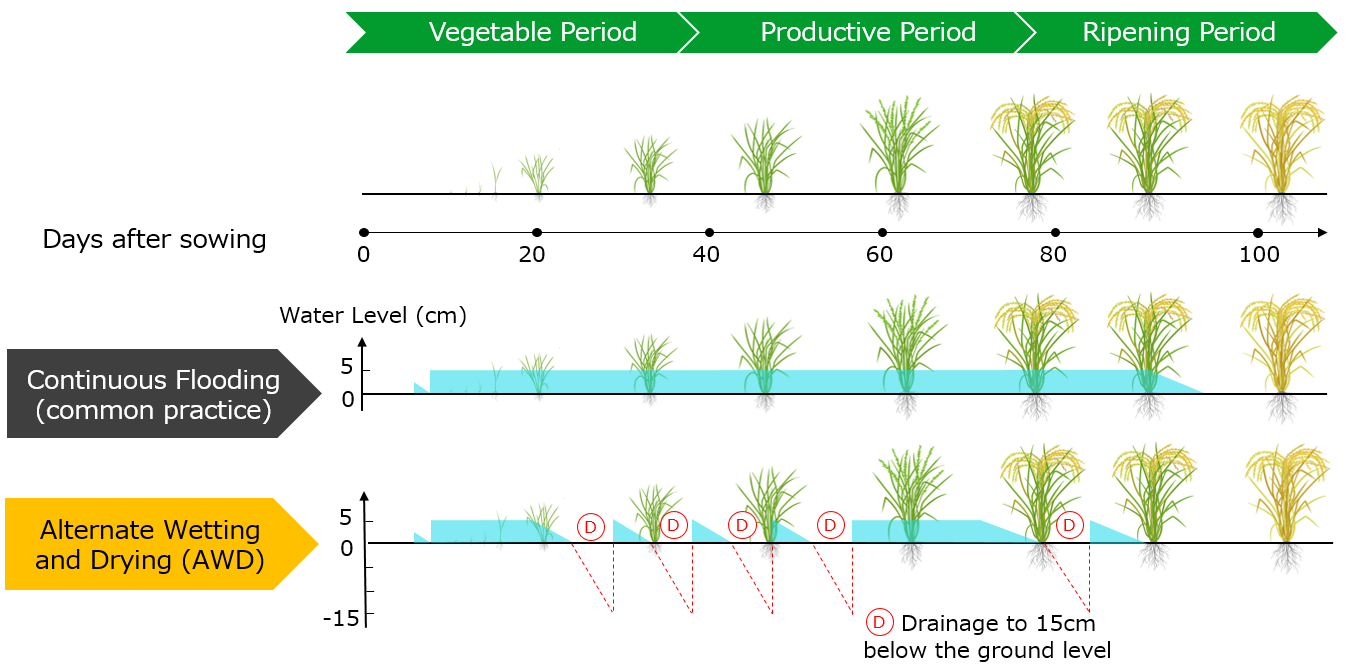Joint Demonstration Project to Reduce Methane Emissions from Paddy Fields in the Philippines Aiming to Be the First Private JCM*1 Project in the Agricultural Sector in the ASEAN Region
February 28, 2024
Kubota Corporation
Creattura Co., Ltd.
Tokyo Gas Co., Ltd.
Kubota Corporation (Head Office: Naniwa-ku, Osaka, Japan; President and Representative Director: Yuichi Kitao; hereinafter “Kubota”), Creattura Co., Ltd. (Head Office: Minato-ku, Tokyo, Japan; Representative Director and CEO: Tomomichi Hattori; hereinafter “Creattura”), and Tokyo Gas Co., Ltd. (Head Office: Minato-ku, Tokyo, Japan; Representative Corporate Executive Officer, President and CEO: Shinichi Sasayama; hereinafter “Tokyo Gas”) are working on a demonstration project (hereinafter “the demonstration project”) so that alternate wetting and drying (hereinafter “AWD”)*2, a water management technique by which reduction of methane emissions from paddy fields is expected, will become widely used in the Philippines and that the demonstration project will be registered as a private JCM project.
1. What is AWD?
AWD is a water management technique where an irrigation control process of draining a rice paddy, drying its ground surface well, and then flooding the rice paddy again is repeated multiple times during the cultivation of paddy rice. Paddy soil includes methanogens, which feed on organic matter such as rice straw and produce methane, a greenhouse gas, under anaerobic conditions. Providing more oxygen to the soil than when a rice paddy is always flooded by draining a rice paddy temporarily inhibits the activity of methanogens, reducing methane emissions.
-

AWD overview*3
Methane has a greenhouse effect 28 times greater than that of carbon dioxide and is said to be the second largest contributor to global warming after carbon dioxide. It is estimated*4 that in the Philippines, where rice cultivation is active, methane from paddy fields accounts for roughly 20% of the greenhouse gases emitted from all industries.
AWD is considered to reduce methane emissions from paddy fields by about 30% and the amount of irrigation water by 6 to 47%*5. For this reason, AWD is attracting attention as an effective means to reduce greenhouse gases in the agricultural sector in ASEAN areas where there are concerns about a shortage of water due to the practice of multiple cropping. It is also expected to increase crop yields through cultivation management suitable for AWD, contributing to an improvement in the income of farmers.
2. Expectation of growing into a private JCM project
The Ministry of Agriculture, Forestry and Fisheries of Japan, in accordance with the Memorandum of Cooperation (MOC)*6 it signed with the Asian Development Bank (hereinafter “ADB”) in 2022, established a committee of experts for the effective use and promotion of JCM in the agricultural sector with the ADB acting as a secretariat and is considering*7 establishing MRV*8 to reduce methane emissions from paddy fields in the ASEAN region and promote the spread of AWD, which is expected to be adopted into the JCM methodology.
3. Outline of the demonstration project
The demonstration project provides training to farmers that helps increase the sophistication of agriculture, including how to select seeds, how to manage soil, and how to implement AWD, and identifies problems and risks by reviewing measures for spreading AWD, increasing the income of farmers, and obtaining data necessary to create carbon credits. We will establish a methodology with a higher guarantee of effectiveness and reliability on the basis of the demonstration results so that our project will be registered as the first private JCM project in the agricultural sector in the ASEAN region and that we can create high-quality carbon credits.
| Period | September 2023 to May 2024 |
|---|---|
| Location | Province of Pangasinan in the Republic of the Philippines |
| Area of paddy fields | About 1,300 ha |
| Number of participating farms | About 600 |
-

Pictures of the farmers in the Philippines being trained
Through co-creation of value by taking advantage of Kubota’s expertise and networks in the agricultural sector, especially the cultivation of paddy rice in ASEAN region, Creattura’s expertise in project development and credit creation in the field of carbon credits, and Tokyo Gas’s expertise in efforts to secure reliability in the field of carbon credits, we will aim for our project to be registered as the first private JCM project in the agricultural sector in the ASEAN region and will work on spreading sustainable agriculture in the Philippines and reducing greenhouse gas emissions in society as a whole.
- *1.JCM (Joint Crediting Mechanism) mainly based on private funds. Under JCM, Japan provides a developing country with Japanese low-carbon technologies and products, systems, services, and infrastructure and thereby contributes to sustainable development such as reduction of greenhouse gases in the developing country, and credits are created from its results and shared between the two countries; under private JCM, credits are given to business operators that are mainly based on private funds without depending on government funds.
- *2.Intermittent irrigation. Website of the National Agriculture and Food Research Organization:
https://www.naro.go.jp/project/results/4th_laboratory/niaes/2017/niaes17_s12.html - *3.The figure was created by Creattura with reference to the website of the Japan International Research Center for Agricultural Sciences:
https://www.jircas.go.jp/en/program/proc/blog/20220712 - *4.Kubota made a trial calculation by using data obtained from the Food and Agriculture Organization of the United Nations’ statistical database (FAOSTAT) and Climate Watch (CAIT).
- *5.Website of the National Agriculture and Food Research Organization:
https://www.naro.go.jp/project/results/4th_laboratory/niaes/2017/niaes17_s12.html - *6.“Partnership towards the realization of a sustainable and strong food and agricultural system in the Asia-Pacific region including the Asian monsoon region,” signed on September 5, 2022:
https://www.maff.go.jp/j/press/y_kokusai/kikou/220906.html - *7.“1st Expert Committee Meeting on Climate-Resilient Agriculture and Low-Carbon Food Systems in the ASEAN Region,” held on January 31, 2024:
https://www.adb.org/news/events/first-expert-committee-meeting-climate-resilient-agriculture-low-carbon-food-systems-asean - *8.A system that measures and reports the status of greenhouse gas emissions reduction and verifies the reduction is called MRV, taking the first letters of the words “Measurement,” “Reporting,” and “Verification.”
- Contact:
-
Carbon Neutral Business Planning Office
Business Incubation Dept.
Innovation Center
KUBOTA Corporation
Email: kbt_g.lowcarbon@kubota.com